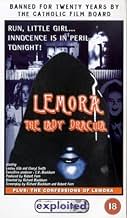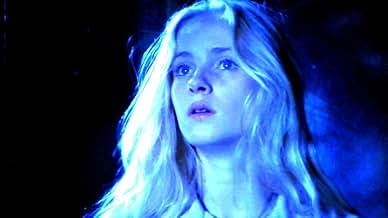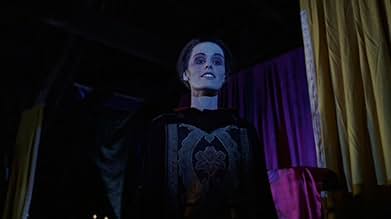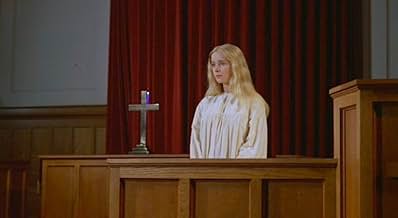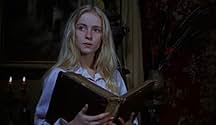IMDb रेटिंग
6.1/10
2.6 हज़ार
आपकी रेटिंग
अपनी भाषा में प्लॉट जोड़ेंA young girl who returns to her hometown to see her dying father finds herself being drawn into a web of vampirism and witchcraft.A young girl who returns to her hometown to see her dying father finds herself being drawn into a web of vampirism and witchcraft.A young girl who returns to her hometown to see her dying father finds herself being drawn into a web of vampirism and witchcraft.
कहानी
क्या आपको पता है
- ट्रिवियाNotably similar to the story Carmilla by Sheridan Le Fanu in which a female seduces a teenage girl. Towards the end of the film Lemora indicates that she has had many names.
- गूफ़When Lila is first taken into the house by Lemora, she is told to go upstairs to her room. Lemora says "It is the first open door at the end of the hall." But when Lila goes upstairs ALL of the doors are closed.
- कनेक्शनFeatured in Movie Macabre: Lemora A Child's Tale of the Supernatural (1983)
- साउंडट्रैकPaper Angel
Sung by The Black Whole
फीचर्ड रिव्यू
Modern audiences may be a little put off by this movie at first glance - just on account of its fairly low production values - but it's definitely superior to most films of its kind, although it's such a unique oddity it's hard to compare it with anything else. Lemora plays more like a dark fairy tale than a horror movie and I actually found it to be thoughtful and moving when I watched it through to the end. Atmosphere, a great story, and a likable and sympathetic protagonist are what make this movie work.
Lemora has got a southern Gothic setting, and it takes place in the 1930's, which gives the film something of the feel of the weird fiction pulp magazines that were prevalent during that time. However, in contrast to most of those tales, the main character in Lemora is a thirteen-year old girl, which gives the movie a sexual/lost innocence subtext in addition to the 'ancient horror' themes that are typical of that tradition.
Lila Lee is an angelic-looking church singer, who we learn is also the daughter of a murdering gangster. Upon receiving a letter from her estranged father (who is now apparently very ill), she sets out on a journey to reunite with him. Every male character she encounters comes across as a leering predator, with the exception of her guardian, the Reverend, who is a good man struggling with his desires to possess the young girl.
Once she leaves for Asteroth, there is no turning back for Lila, as it becomes more and more clear that no matter what should befall her on her journey, she will never be the same singing angel that she once was. And her future looks pretty grim. Stranded in a horrific swampland, she is pursued by its gruesome inhabitants - men who have degenerated into a pack of diseased and squealing brutes - into the domain of a mysterious vampire and her group of immortal warlocks. Cheryl Smith was perfect for this as Lila - her looks and expression throughout conveying Lila's fear and confusion and innocent faith and her longing for someone she can trust; if you can't believe in her, or Leslie Glib as the dark title character, the movie fails, but they pull it off wonderfully. I found the score and songs that were used in Lemora to be strangely moving and the sound effects were often genuinely creepy.
From what I've read, this movie got into some trouble with the church upon it's release and I think it was placed on a list of banned films or something. But, I think that the theme of Lemora would have to be badly misconstrued for it to be seen as offensive in the way that its detractors would probably suggest. There is really nothing polemical or anti-Christian about it that I could see; and the movie treats its devout characters with affection and understanding as they struggle with themselves and the darkness that surrounds them. The ending, while not upbeat, is consistent and honest and makes you feel something. And leaves you thinking.
I own the great-looking DVD of Lemora, and the Synapse company did a terrific job with this movie. It was released in late 2004, with a dedication to the memory of Cheryl Smith, who passed away in 2002. I remember seeing her name (appearing as Cheryl Rainbeaux Smith) in association with a lot of drive-in type horror movies and teen sex comedies, but for years she was just a semi-familiar name to me. But within the last couple years I happened to see Caged Heat and Laserblast again, and came away thinking that there was something unique about this actress. Her presence was always natural and uncontrived, with a sad vulnerability in her eyes and a dreaminess about her that seemed to come from some place beyond this earth.
I was a young child in the 70s when these movies, like Lemora, were released. The adult content of many of the drive-in films of that era obviously kept me from seeing them when they first came out, but I enjoy going back and watching them now, and I've always found the feel and style of that pre-blockbuster period to be oddly creative and interesting. But it also may be that I feel a lot of nostalgia for those naive and carefree times in my own life, when I would have had a small boy's crush on a blonde-haired starlet like Cheryl Smith. I'm not sure I remember seeing any of Cheryl's movies when I was young, but in some way I associate her with a lot of the joy and fascination of those times. I imagine that many other people do too.
Lemora has got a southern Gothic setting, and it takes place in the 1930's, which gives the film something of the feel of the weird fiction pulp magazines that were prevalent during that time. However, in contrast to most of those tales, the main character in Lemora is a thirteen-year old girl, which gives the movie a sexual/lost innocence subtext in addition to the 'ancient horror' themes that are typical of that tradition.
Lila Lee is an angelic-looking church singer, who we learn is also the daughter of a murdering gangster. Upon receiving a letter from her estranged father (who is now apparently very ill), she sets out on a journey to reunite with him. Every male character she encounters comes across as a leering predator, with the exception of her guardian, the Reverend, who is a good man struggling with his desires to possess the young girl.
Once she leaves for Asteroth, there is no turning back for Lila, as it becomes more and more clear that no matter what should befall her on her journey, she will never be the same singing angel that she once was. And her future looks pretty grim. Stranded in a horrific swampland, she is pursued by its gruesome inhabitants - men who have degenerated into a pack of diseased and squealing brutes - into the domain of a mysterious vampire and her group of immortal warlocks. Cheryl Smith was perfect for this as Lila - her looks and expression throughout conveying Lila's fear and confusion and innocent faith and her longing for someone she can trust; if you can't believe in her, or Leslie Glib as the dark title character, the movie fails, but they pull it off wonderfully. I found the score and songs that were used in Lemora to be strangely moving and the sound effects were often genuinely creepy.
From what I've read, this movie got into some trouble with the church upon it's release and I think it was placed on a list of banned films or something. But, I think that the theme of Lemora would have to be badly misconstrued for it to be seen as offensive in the way that its detractors would probably suggest. There is really nothing polemical or anti-Christian about it that I could see; and the movie treats its devout characters with affection and understanding as they struggle with themselves and the darkness that surrounds them. The ending, while not upbeat, is consistent and honest and makes you feel something. And leaves you thinking.
I own the great-looking DVD of Lemora, and the Synapse company did a terrific job with this movie. It was released in late 2004, with a dedication to the memory of Cheryl Smith, who passed away in 2002. I remember seeing her name (appearing as Cheryl Rainbeaux Smith) in association with a lot of drive-in type horror movies and teen sex comedies, but for years she was just a semi-familiar name to me. But within the last couple years I happened to see Caged Heat and Laserblast again, and came away thinking that there was something unique about this actress. Her presence was always natural and uncontrived, with a sad vulnerability in her eyes and a dreaminess about her that seemed to come from some place beyond this earth.
I was a young child in the 70s when these movies, like Lemora, were released. The adult content of many of the drive-in films of that era obviously kept me from seeing them when they first came out, but I enjoy going back and watching them now, and I've always found the feel and style of that pre-blockbuster period to be oddly creative and interesting. But it also may be that I feel a lot of nostalgia for those naive and carefree times in my own life, when I would have had a small boy's crush on a blonde-haired starlet like Cheryl Smith. I'm not sure I remember seeing any of Cheryl's movies when I was young, but in some way I associate her with a lot of the joy and fascination of those times. I imagine that many other people do too.
- ChrisSFrench
- 19 मई 2005
- परमालिंक
टॉप पसंद
रेटिंग देने के लिए साइन-इन करें और वैयक्तिकृत सुझावों के लिए वॉचलिस्ट करें
- How long is Lemora: A Child's Tale of the Supernatural?Alexa द्वारा संचालित
विवरण
- रिलीज़ की तारीख़
- कंट्री ऑफ़ ओरिजिन
- भाषा
- इस रूप में भी जाना जाता है
- Lady Dracula
- फ़िल्माने की जगहें
- Phillips Mansion - 2640 W. Pomona Boulevard, पोमोना, कैलिफोर्निया, अमेरिका(Lemora's house exteriors)
- उत्पादन कंपनी
- IMDbPro पर और कंपनी क्रेडिट देखें
इस पेज में योगदान दें
किसी बदलाव का सुझाव दें या अनुपलब्ध कॉन्टेंट जोड़ें

टॉप गैप
By what name was Lemora: A Child's Tale of the Supernatural (1973) officially released in India in English?
जवाब

